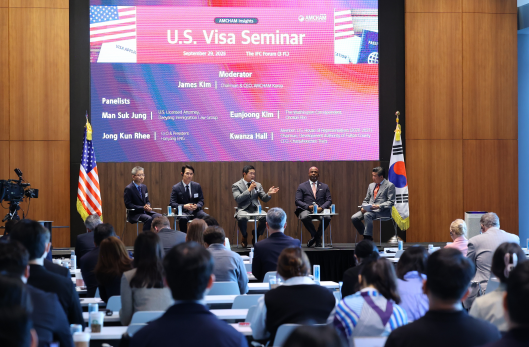 Download
Download
AMCHAM
calls for 'K-visa' to back Korean firms in U.S. market
Immigration raid on Korean workers in Georgia fuels urgency for policy change

By No Kyung-min,
The Korea Herald - The American Chamber of Commerce in Korea hosted a US
visa-focused seminar on Monday, bringing together legal experts and business
leaders to address the practical challenges Korean companies face when entering
the US market.
The timely
event followed a recent immigration raid at a jointly operated Hyundai-LG plant
in Georgia, where more than 310 Korean workers were detained for eight days due
to visa violations, having entered the US under B-1 visas or the Electronic
System for Travel Authorization, which permit only short-term business
activities.
“The Georgia
case underscores how essential it is for companies to fully understand and
comply with US visa rules,” AmCham Chair and CEO James Kim said. “Beyond
compliance, we must also prepare for new opportunities such as the proposed
K-visa, which could strengthen workforce mobility and the US-Korea
partnership.”
In a video
message, US Deputy Secretary of State Christopher Landau expressed strong
support for Korean companies expanding in the American market.
“Investment
from Korean companies is absolutely key to President (Donald) Trump’s vision
for our country,” he said. “Our commitment is to make this process easier, so
that both Korea and the US can prosper together.”
The need for a
Korea-specific visa was brought into focus by Jung Man-suk, a US-licensed
attorney at Daeyang Immigration Law Group, who shed light on the Partner With
Korea Act, which would establish a new E-4 visa category and allocate 15,000
annual slots for skilled Korean professionals.
“Now is the
time to act. Korea’s direct investment in the US is at a record high, and US
trade policy is shifting toward local production with new tariffs on the
horizon,” he said.
“Yet without
visa reform, even fully constructed factories risk sitting idle due to a
shortage of legally deployable skilled labor. Delays caused by labor shortages
could open the door to third-country competitors and weaken the US–Korea
alliance.”
He stressed
that the US, along with Korea, stands to gain substantial benefits -- most
notably, access to skilled Korean technicians in high-tech manufacturing.
“Korea’s
workforce would enhance productivity and reinforce supply chains, while
resolving visa issues would open the door to greater investment and job
creation,” Jung added.
At the panel
discussion, Rhee Jong-kun, CEO of Hanyang ENG — an industrial engineering and
construction firm — stressed the need to send Korean experts to the US to
support workforce training and knowledge transfer.
“There’s a
significant productivity gap between deploying skilled workers from Korea and
hiring locally in the US,” Rhee said. “While Korean involvement is essential in
the early stages, the long-term goal should be to train and collaborate with
local employees so operations can eventually be managed on the ground.”
Adding a note
of encouragement, another panelist, Kwanza Hall, a former US representative for
Georgia, urged the Korean community not to be disheartened by a single setback.
“We in Georgia
were disappointed by the situation and are committed to preventing it from
happening again,” Hall said, adding that the state hopes to serve as a test bed
for innovative solutions and a model for overcoming crises.
"When
challenges arise, you don’t walk away from friends, you stand closer.”